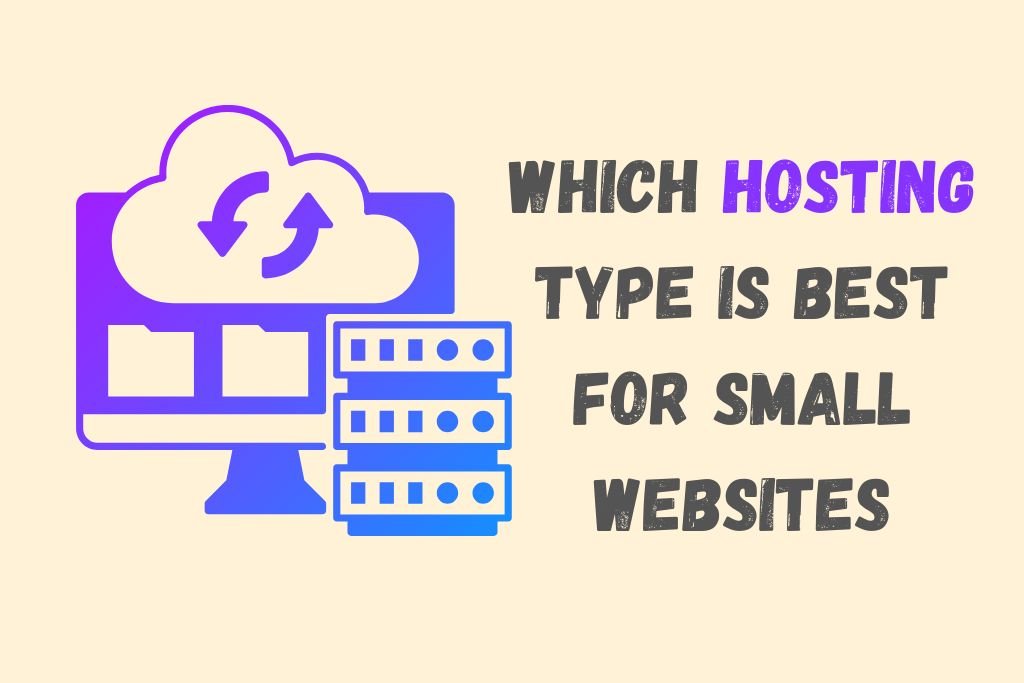Which Hosting Type Is Best for Small Websites
When it comes to launching a small website, choosing the right hosting type is a critical decision. Your choice directly affects your website’s performance, security, scalability, and cost-efficiency. With several hosting options available—each catering to different needs—it’s essential to understand which hosting type suits small websites best.
This comprehensive guide explores various hosting types and evaluates their advantages and limitations, helping you make an informed decision that aligns with your website’s goals and budget.

What Is Web Hosting?
Before diving into hosting types, it’s important to understand what web hosting is. Web hosting is a service that allows individuals or organizations to post a website or web page onto the Internet. A web host provides the technologies and services needed for a website to be viewed online. These websites are hosted on special computers called servers.
Why Hosting Matters for Small Websites
Small websites—such as blogs, personal portfolios, local business sites, or small eCommerce stores—typically have lighter traffic and more modest resource needs than larger websites. However, that doesn’t mean hosting quality can be compromised. Factors like uptime, speed, security, and support still matter significantly.
Types of Web Hosting
There are several types of web hosting to choose from. The best option depends on your website’s technical requirements, expected traffic, budget, and level of control needed.
1. Shared Hosting
Definition:
Shared hosting means your website shares server space with many other websites. All accounts share the same resources, such as RAM, CPU, and disk space.
Pros of Shared Hosting:
- Affordability: Shared hosting is the most budget-friendly option, making it ideal for small websites.
- Ease of Use: Most shared hosting plans come with user-friendly control panels (like cPanel), one-click installs, and minimal technical requirements.
- Maintenance-Free: The hosting provider handles server maintenance, updates, and security.
Cons of Shared Hosting:
- Limited Resources: You share resources with other sites, which may slow down your site during peak traffic times.
- Security Risks: Vulnerabilities in other websites on the same server can impact your website.
- Limited Scalability: As your site grows, performance may decline.
Best For:
Beginners, bloggers, small business websites, and portfolios.
2. Virtual Private Server (VPS) Hosting
Definition:
VPS hosting uses virtualization technology to divide one physical server into multiple virtual servers. Each website gets dedicated resources.
Pros of VPS Hosting:
- Dedicated Resources: Unlike shared hosting, you won’t be affected by other websites.
- Scalability: Easily upgrade resources as your site grows.
- Customization: Full root access allows more control over server configurations.
Cons of VPS Hosting:
- More Expensive: It’s pricier than shared hosting.
- Requires Technical Knowledge: Managing a VPS might require technical skills unless you choose a managed VPS.
Best For:
Small websites expecting moderate traffic growth, or those needing custom server setups.
3. Cloud Hosting
Definition:
Cloud hosting distributes your website across multiple servers, allowing for dynamic resource allocation based on demand.
Pros of Cloud Hosting:
- High Scalability: Instantly scale resources up or down.
- Reliability: If one server fails, another picks up the load—ensuring uptime.
- Performance: Cloud hosting generally offers better performance and faster load times.
Cons of Cloud Hosting:
- Variable Pricing: You may pay more during high-traffic periods.
- Complexity: Slightly more technical to set up and manage than shared hosting.
Best For:
Small businesses with unpredictable traffic, or those planning to scale quickly.
4. WordPress Hosting
Definition:
This is a hosting environment optimized specifically for WordPress websites. It can be shared, VPS, or cloud-based.
Pros of WordPress Hosting:
- Optimized Performance: Enhanced speed and performance for WordPress sites.
- Pre-installed Plugins and Themes: Most providers include helpful tools.
- Security: Custom security configurations to prevent common WordPress vulnerabilities.
Cons of WordPress Hosting:
- Limited to WordPress: Not suitable if you plan to use a different CMS.
- Varied Costs: Prices can vary widely depending on whether it’s managed or unmanaged.
Best For:
Small WordPress blogs, small eCommerce stores using WooCommerce, and portfolio sites.
5. Dedicated Hosting
Definition:
Dedicated hosting gives you an entire physical server dedicated solely to your website.
Pros of Dedicated Hosting:
- Maximum Performance: You get full server resources.
- Full Control: Complete control over server configuration.
- High Security: Greater control over security settings.
Cons of Dedicated Hosting:
- Expensive: Not cost-effective for small websites.
- Technical Management: Requires advanced knowledge to manage properly.
Best For:
Large-scale websites or businesses requiring specific server configurations—not typically recommended for small websites.
Hosting Type Comparison Table
| Hosting Type | Cost | Ease of Use | Performance | Scalability | Best For |
|---|---|---|---|---|---|
| Shared Hosting | $ | ✅✅✅ | ✅ | ❌ | Beginners, bloggers |
| VPS Hosting | $$ | ✅✅ | ✅✅✅ | ✅✅ | Growing sites, tech-savvy users |
| Cloud Hosting | $$$ | ✅✅ | ✅✅✅✅ | ✅✅✅ | Dynamic small businesses |
| WordPress Hosting | $$ | ✅✅✅ | ✅✅✅ | ✅✅ | WordPress users |
| Dedicated Hosting | $$$$ | ❌ | ✅✅✅✅✅ | ✅✅✅ | High-traffic, enterprise websites |
How to Choose the Best Hosting for Your Small Website
1. Consider Your Budget
For beginners or small business owners, cost is often a major concern. Shared and WordPress hosting tend to offer the best value for money. If your website grows later, you can upgrade to VPS or cloud hosting.
2. Evaluate Your Technical Skills
If you’re not technically inclined, go for managed hosting options. Shared and managed WordPress hosting are easy to use and require little to no technical knowledge.
3. Estimate Traffic Expectations
For websites expecting low to moderate traffic, shared or VPS hosting is usually sufficient. If you anticipate high spikes in traffic (e.g., for a product launch), consider cloud hosting for its scalability.
4. Assess Security Needs
For small websites, basic security measures offered by most shared hosting providers are adequate. However, if you’re handling sensitive customer data, consider hosting options that offer SSL, firewalls, and backups.
5. Think About Future Growth
Start small, but think ahead. Choosing a hosting provider that allows easy upgrades will save you headaches down the road.
Best Hosting Providers for Small Websites (2025)
1. Bluehost
- Excellent for WordPress beginners
- Free domain and SSL
- 24/7 support
2. Hostinger
- Budget-friendly plans
- Strong performance for the price
- Easy-to-use hPanel
3. SiteGround
- Great for customer support
- Excellent uptime
- Built-in caching
4. A2 Hosting
- Turbo servers for speed
- Free website migration
- Developer-friendly
5. DreamHost
- SSD storage
- Free automated backups
- Unlimited traffic
Conclusion: What’s the Best Hosting Type for Small Websites?
For most small websites, shared hosting or WordPress hosting is the best starting point. They are affordable, easy to manage, and sufficient for basic needs. If you expect to scale or need more control, VPS or cloud hosting is a better choice. Dedicated hosting, while powerful, is generally overkill for small sites.
In the end, the best hosting type depends on your unique requirements—budget, traffic, scalability, and technical skills. Choose a reputable hosting provider, and start with a plan that meets your current needs while offering room to grow.
Sure! Here’s a well-structured FAQ section for the article “Which Hosting Type Is Best for Small Websites?” — designed to be SEO-friendly and informative:
Frequently Asked Questions (FAQs)
1. What is the best type of hosting for small websites?
The best hosting type for most small websites is shared hosting due to its affordability and ease of use. If you’re using WordPress, a managed WordPress hosting plan is also an excellent choice. For those expecting moderate traffic or needing more control, VPS hosting offers better performance and scalability.
2. Is shared hosting good for small business websites?
Yes, shared hosting is suitable for small business websites that have moderate traffic and do not require complex customizations. It offers all the basic features like email, storage, and SSL at a low cost.
3. When should I upgrade from shared hosting to VPS or cloud hosting?
You should consider upgrading when:
- Your website experiences increased traffic.
- Load times slow down.
- You need better security or more control over server settings.
- Your hosting provider notifies you about resource limits being reached.
4. What is the most affordable hosting type for small websites?
Shared hosting is the most budget-friendly option for small websites. Many providers offer plans starting at just a few dollars per month, which is ideal for startups, blogs, and personal sites.
5. Is managed WordPress hosting worth it for small websites?
Yes, especially if your site runs on WordPress. Managed WordPress hosting handles updates, security, backups, and performance optimization, allowing you to focus on content without technical hassles.
6. Do small websites need cloud hosting?
Not necessarily. Cloud hosting is ideal for small websites expecting traffic spikes or requiring high uptime and scalability. If your site is simple and receives steady traffic, shared or VPS hosting may be more cost-effective.






